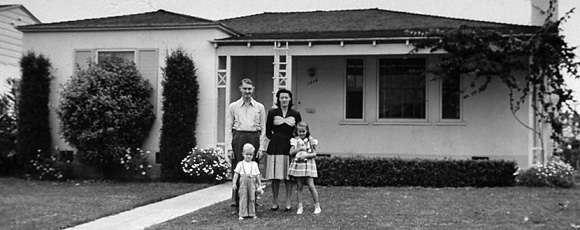
(4 of 4)
The Crack-Up
The story is familiar: Jim Crow was dying in the same hour many whites believed the American Dream was also in extremis. Social customs and values largely taken for granted were under assault. America seemed powerless in Vietnam and unmoored at home. By late 1967, columnist Joseph Kraft had put the phrase Middle Americans in political circulation. Richard Nixon called them "the silent majority."
In 1970 the editors of TIME named "the Middle Americans" as the Man and Woman of the Year, writing that with the exceptions of Daniel Patrick Moynihan and Henry Kissinger, Nixon's Administration was "like the reunion photograph of a Depression class that rose to the top by Horatio Alger virtues." One example Time chose to note: "George Romney, the Secretary of Housing and Urban Development, is the son of a Mormon who was driven out of Mexico by Pancho Villa and supported his 10 children for a time as a carpenter in El Paso."
John Updike captured the cultural moment well in his 1971 novel Rabbit Redux. The middle-class protagonist, Harry "Rabbit" Angstrom, finds himself in a conversation about equality with a black man named Skeeter. "You talk as if the whole purpose of this country since the start has been to frustrate Negroes," says Angstrom. "Hell, you're just ten percent. The fact is most people don't give a damn what you do. This is the freest country around, make it if you can, if you can't, die gracefully."
The Dream that had survived the '30s barely dragged itself out of the '60s. In ensuing decades, the impact of economic growth has been uneven. The widening gap between rich and poor suggests the Dream is becoming more elusive for more people than at any other time in our history. Strangely, it's now possible for the French to be more socially and economically mobile than Americans.
Restoring the Dream
Economic fairness is not a new concern. "There is no reason why wealth, which is a social product, should not be more equitably controlled and distributed in the interests of society," wrote Adams in The Epic of America.
In fact there is a reason: by its very nature capitalism produces winners — and losers. Some dreams come true; some don't. Equality of outcome, though, is not the same thing as equality of opportunity, and equality of opportunity is at the heart of the American vision. "And that dream has been realized more fully in actual life here than anywhere else," Adams wrote, "though very imperfectly even among ourselves."
In 2003, Jim Cullen, a historian who teaches at the Ethical Culture Fieldston School in New York City, published an illuminating book titled The American Dream: A Short History of an Idea That Shaped a Nation. Asked how he assesses the state of his old subject today, Cullen says, "With a lot of folks, I'm afraid I'm not as optimistic as I was. An idea like this does not die overnight, but I'm worried."
What makes the current moment different from previous ebb times, Cullen notes, is the rise of the rest of the world. "In the 19th and 20th centuries, no one spoke of the French Dream or the Russian Dream, but in the 21st century it probably is possible to speak of a Chinese Dream," says Cullen.
Ronald Reagan was eloquent about American possibilities; so is Bill Clinton. Such different men, yet they were both products of a middle-class America that enabled the son of an alcoholic shoe salesman (Reagan) and the stepson of an alcoholic car salesman (Clinton) each to rise to the presidency.
Taken together, the political legacies of Reagan and Clinton are instructive as President Obama — or a President Romney — tries to rebuild a foundation under the middle class. Neither Reagan nor Clinton was particularly doctrinaire: they believed in the capacity of individuals to build lives and create jobs. They differed in degree, not kind, on the question of government's role. Reagan said government was the problem but didn't do a great deal to dismantle it. Clinton declared the era of Big Government to be over but kept the country in the political center as the boom of the 1990s powered by information technology (with roots, inevitably, in government spending) created record surpluses.
And despite the fervently held views of their foes, neither Obama nor Romney is particularly doctrinaire either. This year the choice for President comes at a time when specific ideas about relieving and growing the middle class — education reform and access, for instance — seem less important than the present and the future of the overall economy. The most basic requirement of the American Dream is a job. In 1980 Reagan broke away from Jimmy Carter after asking, "Are you better off today than you were four years ago?" Romney will pose that question again and again; Obama will talk about how it takes longer than three years to reverse a decade of decline. Obama will say Romney favors the rich; Romney will say he wants to create a country where everybody can once again dream of getting rich. The winner will be the one who convinces just enough of us that he, not the other guy, can fuel economic growth. It may not be an edifying conversation, but it's the conversation we're about to have. And both men will talk about the American Dream, but no single politician can restore the faith of our fathers and mothers. That's up to all of us.
We are stronger the wider we open our arms. Our dreams are more powerful when they are shared by others in our time. And we are the only ones who can create a climate for the American Dream to survive another generation, then another and another. "If the American dream is to come true and to abide with us," Adams wrote in 1931, "it will, at bottom, depend on the people themselves." True then, and true now.